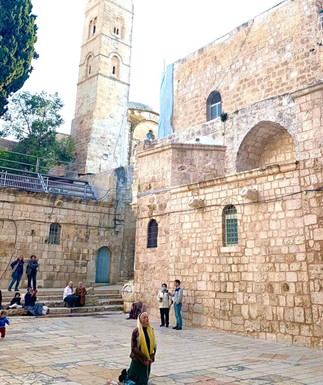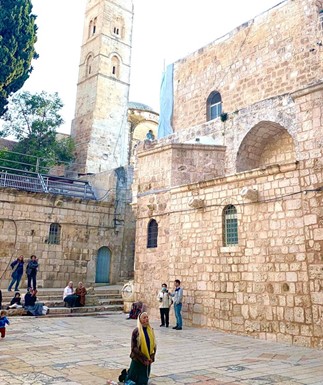Órlaith Meehan and Kerry O’Sullivan
The Church of the Holy Sepulchre is one of the most frequently crowded sights in Jerusalem’s Old City, known for its perpetual throng of tourists. In such a contentious region, large gatherings often denote trouble and are usually quickly dispersed by authorities. However, one morning in March, following Putin’s invasion of Ukraine and the almost immediate rise of the ‘Slava Ukraina’ hashtag, a large crowd accumulated outside the Church for many reasons. Seen in the picture, a young Ukrainian girl kneels in front of the Church with rosary beads in hand and the unmistakable blue and yellow flag around her neck.
She unabashedly prays for her homeland. Tourists of every nationality snapped pictures of this powerful image. Protecting this woman’s prayer for liberty was a halo of black-clad guards casually holding rifles. This was in stark contrast to the scene of a peaceful Palestinian vigil at Damascus gate merely a week prior- which resulted in an aggressive response from the same branch of Israeli security personnel. There was no effort made to guard their right to religious expression. It was a palpable depiction of the hypocrisy of not only the state of Israel but the international response to Palestinian oppression and the wider oppression of people of colour. The irony of this young girl praying for an invaded country in a disputed territory highlights the West’s reluctance to acknowledge oppression suffered by those who do not look like us.

According to recent UN statistics, there are over 4.5 million registered Palestinian refugees worldwide.Almost ⅓ of these refugees live in neighboring Arab countries and occupied territories, often in refugee camps, with poor socioeconomic conditions. Since the Russian invasion of Ukraine in late February, the UN estimates that roughly 3 million Ukrainians have fled to neighboring countries within Europe. Israel itself has welcomed 12,000 Ukrainian refugees since the beginning of the Russian invasion, again providing a stark contrast to the thousands of Palestinian refugees displaced within Israel every year.
In the weeks following the invasion, Israel has also removed many bureaucratic hurdles in order to accommodate Ukrainian Jews whilst simultaneously refusing Palestinians the Right of Return since 1948. This contrast is further accentuated given the recently UN-condemned building of 730 Israeli settlements near Jerusalem. The media outcry for Ukraine is substantial, with
news of arriving refugees in Europe a welcome headline across most international outlets daily. The Ukrainian flag has been adopted by flag masts worldwide as a sign of solidarity. In many cases, the fleeing Ukrainians are granted refugee status almost immediately, an imperative step when applying for aid and seeking asylum. Palestinian refugees have yet to be greeted with such urgency. According to the Parliamentary Assembly of the council of Europe, the legal status of Palestinian refugees is severely contested across member states. In The United States, as of May 2012, the only officially recognised Palestinian refugees are those that were displaced in 1948 – a minuscule figure of around 30,000 people.
This oversimplified and exclusive definition of a Palestinian refugee illustrates the hypocrisy of the so-called protection of human rights by the West. It can not simply be because Palestine, in the eyes of many, is not an officially recognised country. The root of the problem goes deeper into the inherent racial discrimination that permeates Western society. Europe is much quicker to absorb Ukrainians as they are fleeing an invasion of a recognised and uncontested country. Perhaps it can also be attributed to how Ukrainians fit into European society in a manner which does not necessitate a substantial change or understanding of how to facilitate a heterogeneous and multicultural society, in the way that Palestinian refugees would. There is a prevalent reluctance to adapt to society and integrate those of different religions and cultural backgrounds who need protection.
This problem pertains not only to the Palestinian question but seems to be a recurring theme surrounding the reluctance to absorb refugees of colour. Taking the 2014 Syrian refugee crisis as another example – Polish border forces pushed Syrian refugees away and refused them entry. It was the site of this same border where Ukrainians were welcomed like family with tears and placards upon their recent arrival.
Does empathy of this magnitude arise solely when the victims look like us? Where “us” are Caucasian Europeans. Europe has already absorbed thousands more expatriates than the number of Syrian refugees that were seeking asylum in 2014 in a matter of weeks. There is little mention of strained resources and possible political instability. One could infer that the common denominator is a reduced understanding and sense of empathy towards the strife of people of color. The media’s narrative is that the West’s way of life is being threatened. However, this argument loses its validity when actual lives are being threatened.
Poland is not the only European country to maintain a racially charged double-standard regarding refugee policy. Angela Merkel’s initial “Wir schaffen das” commitment resulted in many Syrian refugees gaining entry to Germany after the 2014 Civil War. However, the important distinction should be made in this case, not in the legality of refugee entry, but in the mentality of the German people. Following the influx of over half a million Syrian refugees, public opinion has shifted and the rise of far-right anti-immigration parties indicates a rise in public anxiety around migration. This subsequent change in the German mentality led the German government to orchestrate a social media campaign to deter Syrian refugees from entering the country in 2014.
No such campaign was orchestrated for their Ukrainian counterparts. In contrast, Ukrainians were met in Berlin by supportive crowds and displays of incredible solidarity through the provision of schools, shelter and food.Moreover, Interior Minister Nancy Faeser stated Germany would take refugees fleeing the war in Ukraine ‘regardless of nationality’ and with no dependence on the status of their passport. Germany’s decisive support of Israel and an unwillingness to extend the same recognition towards Palestinian refugees is another manifestation blatant racism. Again, we must ask ourselves why this resolute wave of support is shown only when the oppressed fulfill an exclusionary criterion.
The concept of a refugee is not new.
However, it has previously embodied negative connotations and fear of cultural upheaval within the confines of Europe. The sudden resurgence of the term in a new light brings with it a fresh and much needed attitude change towards those fleeing conflict in Western media. Europe’s commitment to embrace the victims of the Russian invasion should be viewed both as a source of pride and a demonstration for what is possible in future humanitarian crises. Ukrainian refugees have not been discussed through the same lens as those fleeing The Middle East; they have been proudly welcomed and their bravery and willingness to defend their country has been congratulated. We must question why a Ukrainian who throws a Molotov cocktail is a freedom fighter, but a Palestinian taking the same action is branded a terrorist. Europe’s issue does not lie within the intricacies of migration, it lies with a prevailing racial prejudice. That is not to say that the solution is to alienate refugees from each other. The current system and media coverage manifests as a racial hierarchy between refugees. Without undermining the necessary and lifesaving efforts of the West to protect Ukrainians, the next logical step is to extend this warm welcome to all refugees, regardless of religion, race, and ethnicity.
Ben Goldberg, Ari. “US Senate Dramatically Scales down Definition of Palestinian Refugee.” The Times of Israel, May 25, 2022. https://www.timesofisrael.com/us- senate-dramatically-redefines-definition-of-palestinian-refugees/.
Casey, Ruairi. “’The Least We Can Do’: Germany Welcomes Ukrainian Asylum Seekers.” Al Jazeera, March 3, 2022. https://www.aljazeera.com/news/2022/3/3/germany-welcomes-ukrainian-asylum-seekers.
Holloway, Kerry, Irina Mosel, Christopher Smart, Diego Faurés, Gemma Hennessey, Claire Kumar, and Amy Leach. “Public Narratives and Attitudes towards Refugees and Other Migrants.” Web log. Overseas Development Institute (blog), November 1, 2019. https://odi.org/en/publications/public-narratives-and- attitudes-towards-refugees-and-other-migrants-germany-country-profile/.
“OIC Strongly Condemns Israel’s Decision to Build 730 New Settlement Units.” United Nations, March 13, 2022. Organization of Islamic Cooperation. https://www.un.org/unispal/document/oic-strongly-condemns-israels-decision-to-build-730-new-settlement-units-statement-non-un-document/.
“Palestine Refugees.” United Nations Relief and Works Agency for Palestine Refugees in the Near East.. https://www.unrwa.org/palestine-refugees.
“Recommendation 1612- The Question of Palestine.” United Nations, June 25, 2003. The Parliamentary Assembly of the Council of Europe. https://www.un.org/unispal/document/auto-insert-204070/.

